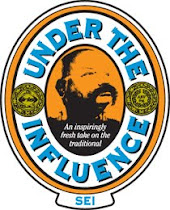
PSFK's 'Good Ideas Salon' was in town on Friday. We sent Planner Ben down to check it out... over to him:
Ben here, reporting back on Friday’s (excellent) PSFK Good Ideas Salon.
First things first, a quick salute to the venue for the day – the Guardian’s new offices. A beautiful space, designed with people in mind: “deliberately social design”, we’re later told - which becomes a bit of a theme for the day. I’m sad to say that, while the Thames probably trumps the Regent’s canal, iris’ new reception area has met its match. 
(this is also where are Network Rail client is at - nice offices)
Observation number two – I don’t think I’ve ever been in a room containing more people wearing black rectangular glasses.
If you’re interested in a run down of the day, then someone’s kindly beaten me to it. Read below for the key themes that jumped out for me, and how they might help us at iris towers. Without further ado:
Legacy
This one came up a few times, in a few guises. From the London Olympics to “jam recipes as heirlooms”, the idea was that people want permanent stuff with lasting value, not just disposable tat. Equally they want the key events in their lives to have a lasting legacy, through services like this
Finding ideas through play
Motto of the day from Coralie Bickford-Smith: “stop designing, start playing”. A really nice thought, and it’s not just designing that it applies to (“stop strategising” would work well…). The point – don’t have an end in sight, don’t be precious about getting to the right answer. Keep your eyes open for new inspiration. Play, experiment. That’s where great ideas come. The tricky bit? Getting clients to buy this approach.
Barter
Freecycle is great “because it avoids the dirtiness of money”. Kate Moross lets people pay for her t-shirts in Phil Collins cd’s. The ability to match up demand and supply without a need for money is more human – relationships become strong when it’s no longer about money. Is this a thought that could work for big brands? First one to sell this idea into a client gets my old vase.
Use marketing to add meaning
A few key methods cropped up for adding value for our punters. Offering utility is obviously a biggie, as giving them free stuff. But design and marketing is also there to provide meaning (richness, experience) to the everyday commodities in people’s worlds. That’s why packaging is so important. An exclusive vinyl adding meaning to a music track - here. A metal tin adding meaning to a fabric mix cd. Premium DM adding meaning to your bingo experience perhaps?
Collaboration and distribution
Distributed content is an idea you’ll know well, if you’ve spent any time with iris digital in the past year. The premise is simple. Don’t make people come to your digital content, put it where they are. It’s something the Guardian are learning how to do very well – and I like how Simon Waldman articulated his aspiration for the Guardian to become “part of the internet”.
Collaboration is a topic of massive importance to the residents of iris towers. Key insights from Penguin and the beeb on how to make it work (1) always be curious – keep finding out what everyone else is working on. (2) get over your ‘stakeholderitis’ – if you let go of an idea it will get better, let other people evolve it with you (3) sitting round a table together is still the best way to collaborate – just make sure it’s not a ‘meeting’ (4) you always need a strong project manager.
Data
Compared to its journalists, printing presses or offices you wouldn’t think that ‘data’ would be one of the Guardian’s most valuable assets. However many of their recent digital successes derive from a new principle for the once-traditional media company - ‘database journalism”. The database team collate all the information, reports and comments collected by journalists and readers, and share it in interesting ways. Here’s a great example
Meanwhile, Christian Nold’s ‘Bio mapping’ is a mine of inspiration for anyone thinking about what to do with mobile phone meta-data. His research techniques, using geographically-mapped physiological data, help him map out a community’s emotional response to their environment. Aggregated neuroscience, if you like. Guess you had to be there… 
And here’s a load of other interesting stuff that cropped up:
Troika’s guerrilla projector , their Terminal 5 cloud and their Newton Virus
Poke’s global rich list –
Find and fix all the broken clocks in the Britain.
Zopa's peer to peer banking (uk.zopa.com/ZopaWeb)
Turn your photos into 3-D spaces with Photosynth
And somewhere to plan your own funeral
But despite all this you get the feeling clients may be asking: Why bother? Why expend all this energy and effort trying to innovate? 90% of new products fail anyway. Over to Mark Earls to answer that one…
- Spending time looking for new ideas allows you to challenge if your old ideas are still any good.
- Keeping your new idea radar running readies you for the real game-changing opportunities when they do come along.
- And working on new ideas is good for business because it makes everyone in your company’s jobs more interesting. I’ll drink to that.
So thanks for all that Ben and well done to Piers and the gang by the sounds of it.
Monday, 2 February 2009
The Good Ideas Salon
Posted by Under The Influence at 18:08
Labels: advertising, Conference, PSFK
Subscribe to:
Post Comments (Atom)

2 Comments:
Good stuff, more comment on this event here.
Thanks for such a thorough write up. Glad you managed to find some good inspiration from the day!
Piers
Post a Comment